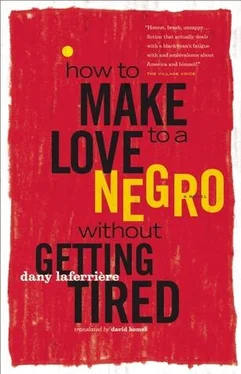Dany Laferrière
How to Make Love to a Negro Without Getting Tired
How to Make Love with the Reader. Slyly
“WHEN MY BOOK came out,” Dany Laferrière recalls with bitterness and amazement, “nobody believed it was written by a black man. They said, Whoever wrote it writes almost like a black. Everyone was so sure it was written by a white. A black couldn’t write like that, they said.”
But the famous photo of Dany sitting in the Carré St-Louis, in his Miller/Bukowski attitude with gym shoes, typewriter and booze-in-a-bag, left the doubters no way out: the Negro of the title was indeed black.
Why did so many readers doubt the narrator’s identity, even after he had revealed his true colors? After all, these same readers were acquainted with black writers rising up to take a stand. The names of some of them are mentioned in this novel as icons, some of which are worn out, others still powerful: James Baldwin, Richard Wright, Chester Himes. But what confounded the expectations of Laferrière’s unsuspecting readers was this erotico-satiric novel with the come-on title that plays both sides of racial and sexual stereotypes against the middle, and takes fatal and uproarious aim at all manner of sacred cows — including young gifted black writers. Here was a novel by a black man that begins by pronouncing a funeral elegy for the myth of the Great Black Lover. And when Laferrière describes himself and his brothers, he uses the word nègre— “Negro,” or even “nigger”—instead of the more politically and socially correct noir —“black.” What kind of Nègre was this anyway? Not one whom readers, white or black, had met before.
When the novel hit bookstore shelves in Montreal in the fall of 1985, it caused a sensation. Laferrière’s ambiguity, and the difficulty of pinning him down, was one of the reasons his book was so infuriating — and so seductive.
Laferrière, meanwhile, was simply following the great tradition of satire, giving students of authorial intention a giant headache. Example: readers on the Left of the political spectrum were condemning this novel for not taking a clear enough stand against racism, even as they recommended it to friends. One critic went after Laferrière for making all his white women English-speaking, not realizing the stereotypical value such things might have for a recent immigrant from Haiti: White = English = America. As Laferrière says in one chapter, “America is a totality.”
Laferrière knows about the totality of America from the underside. Born in Port-au-Prince, he practiced journalism under Duvalier. When a colleague with whom he was working on a story was found murdered by the roadside, Laferrière took the hint and went into exile in Canada. The year was 1978. He did what most immigrants do: start at the bottom. He worked tanning cowhides in a Montreal factory. How to Make Love to a Negro was begun around this time, and when the narrator says at the end of the novel that this book is “My only chance,” we can see where he’s coming from. That manic energy, that bold and sometimes outrageous tone is that of a man eager to get out of the factory and get some respect, a man suffocating in his social position the way the main character suffocates in his overheated room at 3670 rue St-Denis. Some immigrants get to the top through commerce of varying sorts. Laferrière, a voracious reader, understands the lesson of the great Jewish-American writers: you can get to the top with words too.
On one level, How to Make Love to a Negro is a book about one man’s progress as an immigrant. It is, as Leferrière has remarked, the story of a young man who has acquired a culture he was never meant to have; he covets that culture, he wants you to know he’s acquired it (hence, punning literary allusions such as the title of Chapter One), but he doesn’t want to lose his identity in the meantime. That’s where Laferrière parts company with many immigrant novels: the narrator has a distinctly critical eye on the new culture around him, even as he is trying to move into it. Which is another source of ambiguity in the book.
Just as knowing how to manipulate words gets you social mobility, so does making love. Voilà: the eternal marriage of sex and artistic creation. The coupling of white women and black man creates a lot of sparks in this book: the attraction of opposites, the potency of guilt, the weight of history. In one episode, the hero of the piece contemplates the Empire-style family portraits on the wall of an ivy-clad dwelling. What am I doing in such a mansion? he wonders, then answers his own question: I am here to take the daughter of the house to bed. Though nothing in his upbringing prepared him for such a cross-class encounter, he is astute enough to note, “History hasn’t always been good to us, but we can always use it as an aphrodisiac.”
Despite the effective teaser title, in this book sex is mostly an indicator of class, ethnic, and historical conflict. When the hero fails to score, it is because he has committed, not a romantic, but a historical gaffe. Whether it is his praise of carbohydrates to a Scarsdale Diet girl, or his admission that, in his country, people eat cats, the results are hilarious and usually result in the hero sprinting out of his prospective lover’s apartment to try to catch the last subway of the night. Even in the most sensual moments, the hero’s calm, collected consciousness is evaluating the acts of love-making in terms of class and color. I suspect that this attitude, more than any erotic description, led that critic in a Trois-Rivières paper to pontificate that Laferrière “was totally without respect for sexual morality.”
There is another reason for Laferrière’s success that has to do with the Quebec writing scene. His book makes an absolute contrast to virtually everything that has been written in Quebec over the last little while. To read this Nègre, after suffering through the novels of Jansenist isolation and pent-up madness, the stock in trade of so many Quebec novelists, is more than a breath of fresh air — it’s a gale-force wind. Recent Quebec fiction has been so completely fastened to its navel, so lost in grim retrospection, that we can only hope it will never be the same after Laferrière’s madcap characters and their excessive energy.
And without burdening this new writer with the “ethnic” tag, part of the positive response to Laferrière came from the new image he was projecting of an immigrant Quebec. Quebec fiction has always worked with the problems of identity; readers seemed ready to accept Laferrière’s immigrant version of that age-old struggle.
A word about the translation of this novel. When I first met Dany Laferrière and discussed the possibility of making an English version of the book, he said, “It’ll be easy. It’s already written in English. Just the words are in French.” If only that had been true! The problems started as early as the title. When Laferrière uses the potentially derogatory word, nègre, the translator has several choices, but he cannot automatically substitute “black,” despite what current English usage demands. Our word “black” is simply too free of stereotypes and too politically cool to be used in social satire. In this book, there are very few occasions when “black,” the politically correct word, can be used if the translator wants to retain Laferrière’s dynamic between the sexes and colors, in which blacks will always be nègre. I finally decided on “Negro,” alternating when the occasion called for it. “Negro” is outdated, it smells of pre — Black Power liberalism, and because of those echoes it is particularly well suited to Laferrière’s satirical intent.
Читать дальше












